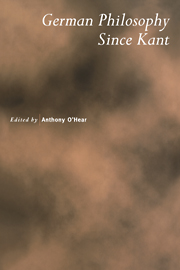Book contents
- Frontmatter
- Contents
- Preface
- Notes on Contributors
- Fichte and Schelling
- Hegel's Critique of Foundationalism in the ‘Doctrine of Essence’
- Schopenhauer's Pessimism
- Karl Marx
- Nietzsche's Virtues: A Personal Inquiry
- Bolzano, Brentano and Meinong: Three Austrian Realists
- Vorsprung durch Logik: The German Analytic Tradition
- German Philosophy of Mathematics from Gauss to Hilbert
- The Revolution of Moore and Russell: A Very British Coup?
- Husserl's Concept of Being: From Phenomenology to Metaphysics
- Frege and the Later Wittgenstein
- Otto Neurath, the Vienna Circle and the Austrian Tradition
- Does the Nothing Noth?
- Reactionary Modernism
- Adorno on Disenchantment: The Scepticism of Enlightened Reason
- Habermas, Science and Modernity
- German Philosophy Today: Between Idealism, Romanticism, and Pragmatism
- The Career of Aesthetics in German Thinking
- Hermeneutic and Analytic Philosophy. Two Complementary Versions of the Linguistic Turn?
- Index of Names
Adorno on Disenchantment: The Scepticism of Enlightened Reason
Published online by Cambridge University Press: 29 September 2009
- Frontmatter
- Contents
- Preface
- Notes on Contributors
- Fichte and Schelling
- Hegel's Critique of Foundationalism in the ‘Doctrine of Essence’
- Schopenhauer's Pessimism
- Karl Marx
- Nietzsche's Virtues: A Personal Inquiry
- Bolzano, Brentano and Meinong: Three Austrian Realists
- Vorsprung durch Logik: The German Analytic Tradition
- German Philosophy of Mathematics from Gauss to Hilbert
- The Revolution of Moore and Russell: A Very British Coup?
- Husserl's Concept of Being: From Phenomenology to Metaphysics
- Frege and the Later Wittgenstein
- Otto Neurath, the Vienna Circle and the Austrian Tradition
- Does the Nothing Noth?
- Reactionary Modernism
- Adorno on Disenchantment: The Scepticism of Enlightened Reason
- Habermas, Science and Modernity
- German Philosophy Today: Between Idealism, Romanticism, and Pragmatism
- The Career of Aesthetics in German Thinking
- Hermeneutic and Analytic Philosophy. Two Complementary Versions of the Linguistic Turn?
- Index of Names
Summary
T. W. Adorno's and Max Horkheimer's Dialectic of Enlightenment is fifty years old. Its disconcerting darkness now seems so bound to the time of its writing, one may well wonder if we have anything to learn from it. Are its main lines of argument relevant to our social and philosophical world? Are the losses it records losses we can still recognise as our own?
Let me begin my re-evaluation indirectly, by citing a passage from Adorno's Minima Moralia, a book of aphoristic fragments whose composition overlapped in part with the writing of Dialectic of Enlightenment. The subtitle of Minima Moralia is Reflections from Damaged Life; one can thus consider its fragmentary form a consequence of the fact that our ethical life is somehow damaged, damaged in such a way that the traditional work of the philosopher, teaching what the good life for man should be, is no longer possible – a thesis which has become part of our present philosophical culture through the writings of Alasdair MacIntyre and Bernard Williams. Adorno's take on this situation is significantly different from theirs. Speaking of the man who ‘conforms his reactions to social reality’, rather than myopically attuning them to private existence, Adorno says:
Where civilisation as self-preservation does not force on him civilisation as humanity, he gives free rein to his fury against the latter, and refutes his own ideology of home, family and community.
- Type
- Chapter
- Information
- German Philosophy since Kant , pp. 305 - 328Publisher: Cambridge University PressPrint publication year: 1999
- 1
- Cited by

